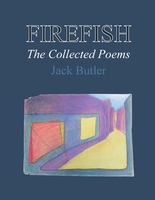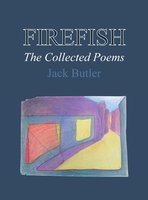by Jack Butler

From the FOREWORD of Firefish by Jack Butler:
None of my published books of poetry have resembled any of my private collections. I think of the published books now (with an appropriate degree of irony) as collections of Jack Butler’s greatest hits.
At last I decided to put together a personal “collected” for circulation to friends and perhaps a few other interested people-this book.
I’ve decided to call the volume Firefish (FF). There’s a poem in the book (“How my Daughter Gave Me the Word”) which explains the origin of the title, but doesn’t begin to suggest the overwhelming effect the moment it celebrates has had on my life. I’ve never been able to commemorate that moment well enough, but the poem at least records the sequence of events accurately, and perhaps a few may glimpse the spark.
For an instant I saw the living goddess of language, and from then on began to understand that we have it backwards: Language has not created poetry, but poetry has created language.
Poetry is not the most specialized, highly evolved, and stylized usage of language, but is there at its very heart, at its root: It is that moment when the word is invented (as all words have been), the moment when the mind makes a connection, and finds its voice.
For me, printed poetry is the record of a speaking voice. I have little interest in purely spatial form, the graphic values of print distributed across a page. What does poetry supply if not story and song? I love the music of meter and rhyme-sonnets, villanelles, ballads, blank verse, tetrameter couplets, nonce forms, all of it. I learned that music early, in the way blues musicians learned to play the guitar from listening to the radio.
It’s not everyone’s music, but it’s mine, and I’ve devoted as much energy and study to it as any astrophysicist deducing the existence of a quasar, as any first violinist in the New York Philharmonic.
That love and study has taught me that meter is at best a friendly and useful ghost, or x-ray skeleton. It is no guarantee of rhythm, much less music. Poetry is a living being, and its musical resources are inexhaustible, no matter what the advocates of any given approach might tell you.If you don’t have a good ear-and there are many Ph.D.s in English who do not-then you will never truly write or even appreciate poetry.
As Louie Armstrong said, “It don’t mean a thing if it aint got that swing.” (I quoted him at the Faulkner Conference in New Orleans in 1999, when I was on the panel “The Meter and Musicality of Poetry,” a panel whose discussions led me later to write “The Mother Tongue.”)
Perhaps as many as half my poems are not explicitly formal, but my mind’s ear has been trained on formal verse, and that influence has greatly affected my “free” verse. My senses of movement, pause, echo, color, and music all owe a great deal to the love of formal music.
Order Firefish: The Collected Poems
Firefish – paperback:
8.5 x 11 inches
498 pages
ISBN: 979-8-3494-1783-2
$30.00
Firefish – hardcover:
8.5 x 11 inches
498 pages
ISBN: 979-8-3494-3102-9
$37.00
Or scan this QR code
for the paperback Firefish:

Or scan this QR code
for the hardcover Firefish:




It’s about time!
Yes, about time. Let’s see that book in all the shops….
The opening poem in one of my books says succinctly what I love and admire about Jack’s work, and gets at what he says about musicality and voice:
THE WORD SWAGGER
Swagger is a nice word most
especially when there is a deficit of swagger.
Swagger is what you crave,
like the full tilt grit of Janis Joplin,
or the guttural smolder of James Brown.
Swagger is a flood of Elvis lookalikes
in Las Vegas—it’s that glitzy, that raw.
Swagger is a mouth harp, a fiddle,
it’s Ginger Baker in a bluegrass band.
Swagger is getting back your bite
like Jerry Lee after the world
has kicked you in the teeth.
Swagger is a nice word after good,
but swagger is even nicer after bad.
Swagger is what you have left
when the world has nothing left to give.
Swagger is a bray without a mule.
C George Drew